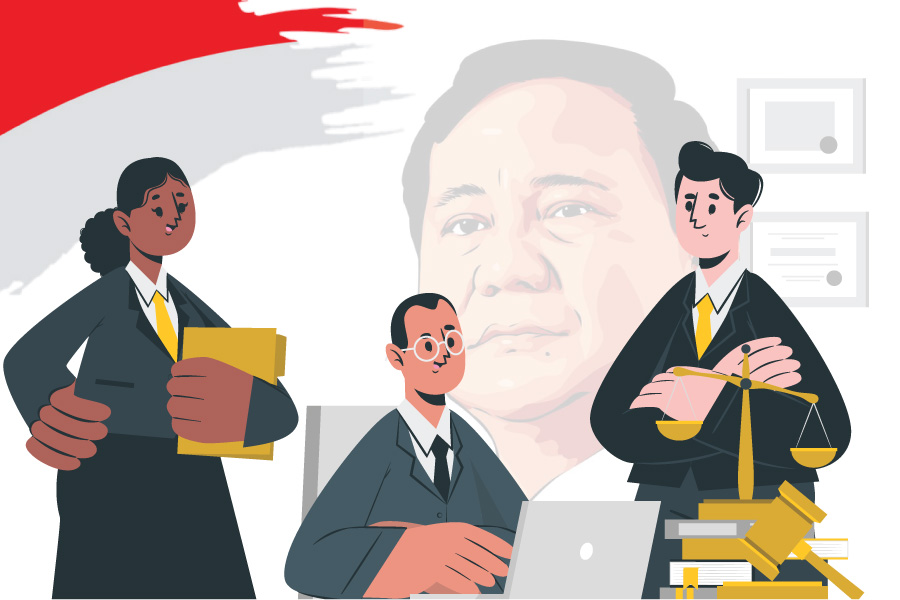Astha Cita of General TNI (Ret.) Prabowo Subianto:
Strengthening Political, Legal, and Bureaucratic Reforms

The Astha Cita of General TNI (Ret.) Prabowo Subianto is an idea based on efforts to strengthen political, legal, and bureaucratic reforms in Indonesia. This concept arises from the view that these three sectors are the primary foundations for building good and just governance.
General TNI (Ret.) Prabowo Subianto recognizes that the challenges faced by Indonesia, both at the national and global levels, can only be addressed with a more transparent political system, fair laws, and an efficient bureaucracy. Through Astha Cita, Prabowo aims to create significant changes in the structure of the Indonesian government, enabling it to meet the people’s expectations for a clean and democratic administration.
In terms of political reform, General TNI (Ret.) Prabowo Subianto emphasizes the importance of political stability achieved through inclusive and transparent democracy. The current political system is considered vulnerable to the influence of oligarchy and corrupt practices that hinder public participation in the decision-making process. This political reform is not only aimed at limiting the power of oligarchs but also ensuring that politics serves as a means to achieve the common good, rather than merely an arena for power struggles.
Furthermore, legal reform is an important priority in Prabowo’s Astha Cita. He believes that a strong and independent legal system is an absolute prerequisite for achieving social justice. However, the law in Indonesia is often influenced by certain interests, which diminishes its ability to function as a protector of the people’s rights. Prabowo is committed to strengthening the independence of law enforcement agencies such as the police, prosecutors, and courts, so they can operate professionally without political interference. Alongside efforts for political and legal reform, Prabowo also sees the need for profound bureaucratic reform. A slow and corrupt bureaucracy often hinders the implementation of public policies aimed at improving the welfare of the people. Therefore, bureaucratic reform is not only crucial for increasing government efficiency but also for creating more responsive and transparent public services.
To achieve this, he encourages the implementation of digital technology within the bureaucratic system, as well as the enhancement of human resource competencies in the government sector. A modern bureaucracy must be results-oriented and focused on serving the community, rather than on complicated and convoluted procedures.
Thus, the integration of political, legal, and bureaucratic reforms in the Astha Cita of General TNI (Ret.) Prabowo Subianto reflects a grand vision for building a stronger and more sovereign Indonesia. These three aspects are closely interconnected in creating effective and just governance. Without comprehensive reforms in the fields of politics, law, and bureaucracy, various fundamental issues faced by Indonesia, such as corruption and inefficiency, will be difficult to address.
Therefore, Astha Cita is designed as a guide to strengthen state institutions and ensure that governance operates according to the principles of democracy and justice. Thus, political reform becomes one of the important pillars in Astha Cita, aimed at creating a cleaner, more transparent, and inclusive political system.
At the same time, one of the biggest issues in the Indonesian legal system is the weak law enforcement that is often influenced by political and economic interests. Through Astha Cita, Prabowo is committed to strengthening the independence of law enforcement agencies, including the police, prosecutors, and courts, so they can perform their duties without interference.
This legal reform also includes updating regulations to better align with contemporary challenges, particularly in addressing cybercrime and human rights violations. With a fairer legal system, public trust in the government can be restored.
Bureaucratic reform is the third pillar of Astha Cita, aimed at creating a more efficient bureaucracy that is responsive to the needs of the community. Slow and corrupt bureaucracy often serves as a major obstacle in the implementation of public policies. Therefore, the digitalization of bureaucracy and the enhancement of civil servant competencies are necessary so that public services can be delivered more quickly and efficiently. This bureaucratic reform also aims to facilitate public access to government services while minimizing corrupt practices at the bureaucratic level.
Through the integration of political, legal, and bureaucratic reforms, Prabowo seeks to create a governance system that is people-oriented. Clean and transparent political reform will create a stronger democratic legitimacy, while fair legal reform will enhance public trust in the justice system. On the other hand, efficient bureaucratic reform will ensure that public policies can be effectively implemented and provide tangible benefits to the people.
Thus, Astha Cita offers a holistic approach to improving governance in Indonesia. Astha Cita General TNI (Ret.) Prabowo Subianto represents a comprehensive vision that encompasses three key elements of good governance: politics, law, and bureaucracy. These three elements support each other in creating a more just, effective, and people-oriented government.
Prof. Dr. Drs, Ermaya Suradinata, SH, MH, MS, adalah mantan Direktur Jenderal Sosial Politik Kementerian Dalam Negeri RI, dan Gubernur Lemhannas RI (2001-2005).
